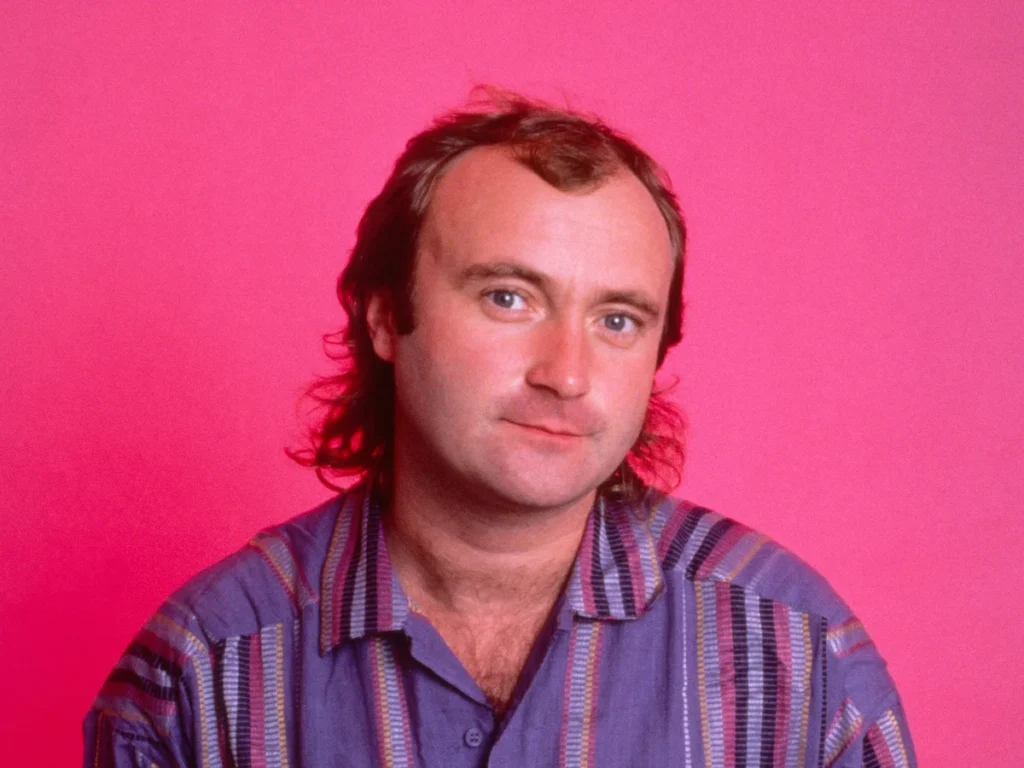Phil Collins is a name synonymous with a certain era of music, where pop, rock, and soul converged to create a distinctive sound that has stood the test of time. As a drummer, singer, songwriter, and producer, Collins has carved out a legacy that is both vast and varied, impacting the music industry in a way few others have. His career spans over five decades, from his early days with the progressive rock band Genesis to his solo career that brought him international stardom. Collins’ music, known for its emotional depth and technical proficiency, continues to resonate with audiences worldwide.

The Genesis of Phil Collins
Before delving into Phil Collins’ solo albums, it’s essential to understand his roots in Genesis, the band that first brought him to the public eye. Formed in 1967, Genesis was originally a progressive rock band with a penchant for complex time signatures, lengthy instrumental passages, and conceptual albums. When Collins joined the band as a drummer in 1970, the group was still led by Peter Gabriel, whose theatrical stage presence defined Genesis’ early years.
Collins initially took a backseat, contributing mainly as a drummer and occasional backing vocalist. However, when Gabriel left the band in 1975, Collins stepped up as the lead singer. This transition marked a significant shift in Genesis’ sound, steering the band toward a more accessible, pop-oriented direction while retaining elements of their progressive rock roots. Collins’ voice, which had a unique ability to convey both vulnerability and strength, became a defining feature of Genesis’ music during this period.
Albums like A Trick of the Tail (1976), Wind & Wuthering (1977), and …And Then There Were Three… (1978) showcased Collins’ growing influence within the band, but it was the release of Duke (1980) and Abacab (1981) that truly signaled Genesis’ shift into the mainstream. These albums contained shorter, radio-friendly tracks that appealed to a broader audience, setting the stage for the band’s commercial peak in the 1980s.

The Birth of a Solo Star
As Genesis found success in the mainstream, Phil Collins began exploring the possibility of a solo career. His first solo album, Face Value (1981), was a revelation, showcasing a more personal and introspective side of Collins that had been only hinted at in his work with Genesis. The album’s lead single, “In the Air Tonight,” became an instant classic, with its haunting atmosphere, sparse arrangement, and iconic drum break capturing the imagination of listeners worldwide.
Face Value was a critical and commercial success, establishing Collins as a solo artist in his own right. The album’s success also paved the way for a series of solo releases that would solidify his status as one of the most successful musicians of the 1980s and 1990s. Over the years, Collins would go on to release a string of albums that not only showcased his versatility as a musician but also reflected the changing landscape of popular music.
1. Face Value (1981)
Face Value is perhaps the most significant album in Phil Collins’ solo career, not only because it was his debut, but also because it set the tone for much of what was to come. The album was born out of personal turmoil, particularly Collins’ divorce from his first wife, Andrea Bertorelli. This emotional upheaval is reflected in the album’s lyrics, which are often introspective and raw.
The album opens with “In the Air Tonight,” a song that has become synonymous with Collins’ career. Its dark, brooding atmosphere, combined with Collins’ plaintive vocals and the unforgettable drum break, made it an instant hit. The song’s lyrics, though somewhat ambiguous, convey a sense of betrayal and loss, themes that run throughout the album.
Other standout tracks include “This Must Be Love,” a gentle, soulful ballad, and “I Missed Again,” a more upbeat track with a strong brass section that hints at Collins’ love for Motown and soul music. The album also features a cover of The Beatles’ “Tomorrow Never Knows,” reinterpreted with a more modern, electronic sound.
Face Value was a commercial success, reaching number one on the UK Albums Chart and number seven on the US Billboard 200. It also received widespread critical acclaim, with many praising Collins’ ability to blend pop, rock, and soul influences into a cohesive whole. The album’s success marked the beginning of Collins’ solo career and established him as a force to be reckoned with in the music industry.
2. Hello, I Must Be Going! (1982)
Following the success of Face Value, Collins quickly returned to the studio to record his second solo album, Hello, I Must Be Going! Released in 1982, the album continued to explore themes of love and loss, but with a slightly more polished sound. While it didn’t quite reach the commercial heights of its predecessor, Hello, I Must Be Going! was still a major success, and it further cemented Collins’ reputation as a solo artist.
The album’s lead single, “You Can’t Hurry Love,” is a cover of the classic Supremes hit, and it became one of Collins’ most successful singles, reaching number one in the UK and number ten in the US. The song’s upbeat, Motown-inspired sound was a departure from the darker tone of Face Value, and it showcased Collins’ versatility as a performer.
Other highlights on the album include “I Don’t Care Anymore,” a defiant track with a powerful drum beat and emotionally charged lyrics, and “Thru These Walls,” which features a haunting melody and introspective lyrics. The album also includes several ballads, such as “Don’t Let Him Steal Your Heart Away” and “Why Can’t It Wait ’Til Morning,” which further demonstrate Collins’ ability to convey deep emotion through his music.
Hello, I Must Be Going! was another commercial success for Collins, reaching number two on the UK Albums Chart and number eight on the US Billboard 200. While it may not have had the same impact as Face Value, it solidified Collins’ status as one of the leading artists of the 1980s.
3. No Jacket Required (1985)
No Jacket Required is arguably Phil Collins’ most successful and well-known album. Released in 1985, it was a massive commercial success, topping the charts in multiple countries and earning numerous awards, including three Grammy Awards, one of which was for Album of the Year. The album’s sleek production, catchy hooks, and infectious energy made it a defining album of the 1980s.
The album opens with “Sussudio,” a track that epitomizes the sound of the 1980s with its synthesizers, drum machines, and upbeat tempo. The song was a huge hit, reaching number one on the Billboard Hot 100 and becoming one of Collins’ signature songs. “One More Night,” another single from the album, is a soulful ballad that also reached number one on the Billboard Hot 100.
No Jacket Required features a mix of uptempo tracks and ballads, with standout songs including “Don’t Lose My Number,” “Take Me Home,” and “Inside Out.” The album also includes the song “Long Long Way to Go,” a somber track with a guest appearance by Sting, which adds a touch of gravitas to the album’s otherwise upbeat tone.
One of the key factors behind the success of No Jacket Required was its production. Collins, along with producer Hugh Padgham, crafted a sound that was both polished and radio-friendly, with a focus on synthesizers, drum machines, and brass sections. This production style would go on to influence countless other artists in the years to come.
No Jacket Required was a monumental success, selling over 12 million copies in the US alone and over 25 million copies worldwide. It remains one of the best-selling albums of all time and a defining moment in Collins’ career.
4. …But Seriously (1989)
By the time …But Seriously was released in 1989, Phil Collins was at the height of his fame. The album marked a shift in tone from the upbeat, pop-oriented sound of No Jacket Required to a more serious, introspective approach. The album’s themes touch on social and political issues, as well as personal reflections, making it one of Collins’ most mature and thought-provoking works.
The album’s lead single, “Another Day in Paradise,” addresses the issue of homelessness and became one of Collins’ most successful and enduring songs. The song’s poignant lyrics, combined with its haunting melody, struck a chord with listeners worldwide, and it topped the charts in multiple countries, including the US and UK. “Another Day in Paradise” also earned Collins his seventh and final Grammy Award for Record of the Year.
Other standout tracks on the album include “I Wish It Would Rain Down,” a soulful ballad featuring a powerful guitar solo by Eric Clapton, and “Something Happened on the Way to Heaven,” an upbeat track with a driving rhythm and catchy chorus. The album also features “Do You Remember?” and “That’s Just the Way It Is,” both of which reflect on the passage of time and the inevitability of change.
…But Seriously was a massive commercial success, topping the charts in numerous countries and selling over 15 million copies worldwide. The album’s more serious tone and socially conscious lyrics resonated with listeners, and it remains one of Collins’ most critically acclaimed works.
5. Both Sides (1993)
Both Sides, released in 1993, is one of Phil Collins’ most personal and introspective albums. Unlike his previous albums, which featured contributions from various musicians and producers, Both Sides was almost entirely a solo effort, with Collins writing, producing, and performing all of the instruments and vocals himself. This gave the album a more intimate and cohesive sound, as well as a greater focus on personal themes.
The album opens with the title track, “Both Sides of the Story,” a song that addresses issues of conflict and misunderstanding. The song’s powerful lyrics and driving rhythm set the tone for the rest of the album, which explores themes of love, loss, and self-reflection.
One of the standout tracks on the album is “Everyday,” a heartfelt ballad that reflects on the end of a relationship. The song’s simple arrangement, with its gentle piano melody and understated vocals, allows the emotional depth of the lyrics to shine through. Another highlight is “We Wait and We Wonder,” a song that reflects on the impact of terrorism and violence in the world.
Both Sides received mixed reviews upon its release, with some critics praising its introspective nature and others criticizing its slower, more subdued sound. However, the album was still a commercial success, reaching number one in the UK and number 13 on the US Billboard 200.
Over time, Both Sides has come to be appreciated as one of Collins’ most personal and honest works, offering a glimpse into his inner world and the struggles he faced during this period of his life.
Legacy and Influence
Phil Collins’ influence on music is undeniable. As a solo artist and as a member of Genesis, he has left an indelible mark on the music industry. His ability to blend pop, rock, and soul influences into a cohesive whole, combined with his distinctive voice and exceptional drumming skills, has earned him a place among the greatest musicians of all time.
Collins’ music has resonated with audiences across generations, and his songs continue to be played on radio stations, streamed online, and used in films and television shows. His work has also inspired countless artists in various genres, from pop and rock to hip-hop and electronic music.
Despite facing health challenges in recent years, including issues with his back and hearing, Collins has continued to perform and record music. His impact on the music industry remains as strong as ever, and his legacy will undoubtedly endure for years to come.





Conclusion
Phil Collins’ music is a testament to his talent, versatility, and emotional depth. From the raw, personal reflections of Face Value to the polished, pop-oriented sound of No Jacket Required, and the introspective nature of Both Sides, Collins’ albums offer a rich and diverse body of work that has touched the hearts of millions.
As we look back on his career, it’s clear that Phil Collins is not just a musician but a storyteller, using his music to explore the human experience in all its complexity. His ability to connect with listeners on such a deep level is what has made his music so enduring and what will ensure that his legacy lives on for generations to come.









